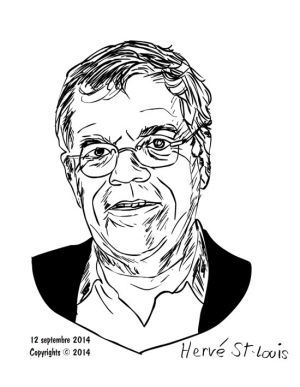Comics /
Spotlight /
Knowledge and Scholarship
The Control Revolution: Not a Medium Theory Affair
By Hervé St-Louis
October 4, 2014 - 12:52
 |
| James Beniger |
Canadians studying information or
communications have heard of Marshall McLuhan’s
Understanding Media.
American graduate students will be familiar with sociologist James
Beniger’s
The Control Revolution. Those of us with the best professors
and faculties will study both texts. I refer to McLuhan only to
highlight Beniger’s work. Of the two, Beniger is the one scholars relate
the most with. McLuhan is better known by the public but not always a
favourite of social scientists.
Both
Beniger and McLuhan draw on information theory. Each argues in
different ways that technology extends from the senses of humans
(Beniger 1986; McLuhan 1994). That’s where similarities end. Beniger
explained his propositions in endless research. McLuhan, in his late
work wrote probes. Probes are like tweets. Short, sweet but with limited
context. McLuhan was not without meaning. He convulsed in endless
references to literature. Still, he had a passive aggressive attitude
towards references. But unless you are a humanist who has read James
Joyce’s Ulysses ten times, you may need some help.
Beniger
is as erudite as McLuhan. But like a traditional scholar, he references
every citation. He also explains the theses of the people he cites. He
provides the needed contextual information to understand where he wants
to take you next in his argument. You don’t need to know Talcott
Parsons’s work to understand how he favoured the agency of individuals.
Beniger wants you to understand how Parsons’s agency resembles Herbert
Spencer’s structuralism. One benefit of reading Beniger is that he
doesn’t write like Anthony Giddens! He doesn’t complicate his thesis
like Niklas Luhmann to make you run for a Wikipedia cliffnote. Beniger
is clear.
He argues
that the current information society is a reaction to the Industrial
Revolution of the 19th century (Beniger 1986). As transportation and
communication technologies evolved, industrialists needed tertiary
controls to manage industrialization (Beniger 1986). Information
technologies provided a rationalization that allowed the
bureaucratization necessary to harness industrial technologies (Beniger
1986).
Control, for
Beniger is an act that living organisms do to organize the information
they need to sustain themselves (Beniger 1986). This information exists
through the consumption of energy and matter. Inorganic matter does not
need organization to have order (Beniger 1986). When living organisms
stop organizing information, they fall prey to random entropy and death
(Beniger 1986). Entropy is random information without meaningful
structure. Understanding information theory literature helps understand
Beniger.
Beniger
links information theory to living and technological information
systems. He asks his readers to step aside and see the greater picture
in several past control revolutions. He argues that we have trouble
seeing the origins of postmodern information society because we are too
close to it (Beniger 1986). Beniger does not tie information theory to
information architecture. He wrote his book before the Internet’s
potential to help organize the word’s knowledge started. But that’s why
graduate students like me exist to make such connections.
Works Cited
Beniger, James R.
The Control Revolution: Technological and Economic Origins of the Information Society. Cambridge, Massachusetts: Harvard University Press, 1986.
McLuhan, Marshall.
Understanding Media: The Extension of Man. First MIT Press edition, 1994. Cambridge: The MIT Press, 1994.
Last Updated: January 17, 2025 - 08:20
